Photo Credit: Getty Images
Tensions between nuclear-armed neighbors India and Pakistan intensified dramatically on May 7, 2025, when India conducted airstrikes against multiple targets inside Pakistani territory. The military action, described by India as "measured and responsible," targeted what officials called "known terror camps" linked to last month's terrorist attack that killed 26 civilians in Kashmir.
"Evidence pointing towards the clear involvement of Pakistan-based terrorists" prompted the strikes, according to India's official statement. Military spokespeople in New Delhi specified that the operations targeted "terrorist infrastructure" associated with militant groups Jaish-e-Mohammed and Lashkar-e-Taiba.
Pakistani authorities vehemently denied these claims. "This is an unprovoked and blatant act of war that violated Pakistan's sovereignty," Pakistan's government declared in its statement. Pakistani officials reported that 26 civilians were killed and 46 wounded in the attacks, insisting that no militant camps were hit.
The situation deteriorated further when Pakistan launched what it called a "measured but forceful" response. Pakistani military claimed to have downed five Indian aircraft—an assertion that remains unverified. Indian officials acknowledged some aircraft losses but remained vague about details.
Evidence emerged suggesting significant Indian casualties. Three officials speaking on condition of anonymity confirmed aircraft crashes. Trevor Ball, a weapons researcher at Armament Research Services, identified debris in Kashmir's Wuyan village as "likely from a Rafale or Mirage fighter jet" used by India.
Cross-border shelling intensified following the initial strikes. Residents in India-controlled Kashmir reported at least 10 deaths and 50 injuries from Pakistani shelling. Manoj Sinha, Kashmir's lieutenant governor, ordered civilian evacuations to safer locations.
The conflict's scope expanded beyond the disputed Kashmir region when India struck targets in Pakistan's Punjab province—the first such attack since their last full-scale war. This geographical expansion signifies a dangerous escalation between the nuclear neighbors.
International reaction was swift. At the White House, President Trump called the escalation "a shame," adding, "They've been fighting for a long time. I just hope it ends very quickly." UN Secretary-General António Guterres urged restraint, stating, "The world cannot afford a military confrontation."
Indian National Security Adviser Ajit Doval briefed U.S. Secretary of State Marco Rubio shortly after the strikes, underscoring the conflict's global implications.
Pakistan promised to "respond at a time, place and manner of its choosing to avenge the loss of innocent Pakistani lives," raising fears of further hostilities in what analysts describe as "one of the world's most dangerous flashpoints."


